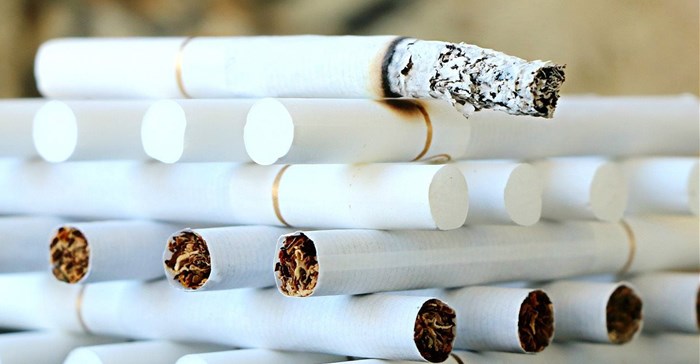






While an overstatement of the illicit trade of tobacco products may suit the tobacco-industry agenda when it comes to mid-term budgets, it should not deter strong tax increases aimed at reducing tobacco consumption in South Africa, says Dr Sharon Nyatsanza of the National Council Against Smoking.
Focus should fall on strong law enforcement and securing the tobacco supply chain to reduce the illicit trade problem.
While British American Tobacco South Africa (Batsa) has been headlining with comments that nearly 70% of all cigarettes being consumed in the South African market are from illicit brands, the Research Unit on the Economics of Excisable Products (REEP) at the University of Cape Town has estimated illicit trade was between 54% and 58% of the total market in 2021.
These findings are based on a gap analysis where self-reported consumption estimates are compared to legitimate sales.
According to Nicole Vellios from REEP, since 2010, the illicit cigarette market has increased sharply. By 2017, illicit trade accounted for between 30% and 35% of the total market.
In 2020, the illicit market was greatly stimulated by the 20-week sales ban, where no cigarettes were sold legally and where the government received no excise tax revenue over that period.
Vellios found no evidence that excise tax increases are linked to an increase in illicit trade.
When excise taxes were increasing rapidly, illicit trade was stable (2002−2009). On the other hand, when excise tax increases were relatively modest, illicit trade increased rapidly (2010−2021).
Nyatsanza says that as illicit tobacco products are sold at ridiculously low prices, they are more accessible and affordable to young people, a major concern.
South Africa is a State that is party to the World Health Organization's framework convention on tobacco control, therefore has an obligation to protect the vulnerable groups, in particular the youth, from exposure to tobacco products.
“Illicit trade fundamentally undermines public health policy; it is a real problem for South Africa and it must be addressed. More attention should be focused on implementing solutions to the problem. Strong enforcement and securing the tobacco supply chain can reduce the illicit trade problem. While we appreciate the efforts by government so far, we urge the enforcement agencies to do more.”
The South African government has yet to ratify the Protocol to Eliminate Illicit Trade in Tobacco Products (ITP), which proposes measures to tackle illicit trade in tobacco products. “In its report in March 2021, on the 2021 fiscal framework and revenue proposals, the standing committee on finance made recommendations for government to ratify the ITP. To date, no further developments have been reported.”
The South African Revenue Service (Sars), through its criminal and illicit economic activities and customs divisions, has stepped up efforts in carrying out inspections as well as search and seizure operations on cigarette companies and manufacturers.
The Sars commissioner, Edward Kieswetter, reiterated government’s commitment to combatting illicit trade and criminal economic activities in February, saying “Those who systematically and deliberately set out to deprive what is due to fiscus through fraudulent and other non-compliant activities, will be confronted and dealt with. This kind of conduct will be made hard and costly.”
Kieswetter has further revealed that Sars has earmarked R120m to modernise its customs. Upscaling tax administration at Sars is urgently needed.
Technologies such as a track and trace system and unique identification codes on packages will make it possible to track the intended destination and source or the manufacturer of the products, and nail down illicit trade.
“The solutions to reduce illicit trade through securing the supply chains have often been reiterated and must now be implemented effectively,” says Nyatsanza.
Sars must also ensure that the tobacco industry does not interfere with solutions to illicit trade, according to Nyatsanza.
“Tobacco companies big and small have publicly accused each other of having a hand in illicit trade. Sars has previously launched proceedings against legal tobacco companies on account of tax evasion.
"Products from legal manufacturers can find their way into the illicit market as ghost exports, made for foreign markets and securing tax exemptions, but then never leaving South Africa.”
A University of Cape Town study analysing the illicit market in South Africa reveals that the main problem is the undeclared local production, much more than smuggling. As such, caution must always be taken when tobacco companies play victim.
Growth in the illicit tobacco trade should not discourage policymakers from raising taxes on tobacco products and taxing e-cigarette products, according to Nyatsanza.
"Together with our Protect our Next partners, the National Council Against Smoking commends the National Treasury on publishing the 2022 draft Taxation Laws Amendment (Tlab) which proposes a tax for e-cigarettes.
"Excise taxes, which result in higher prices, have proven to be the most effective policy tool to reduce consumption.
"The Control of Tobacco Products and Electronic Delivery Systems Bill, containing further essential measures to reduce consumption of tobacco and better protect the health of South Africans, should also be passed with urgency.”